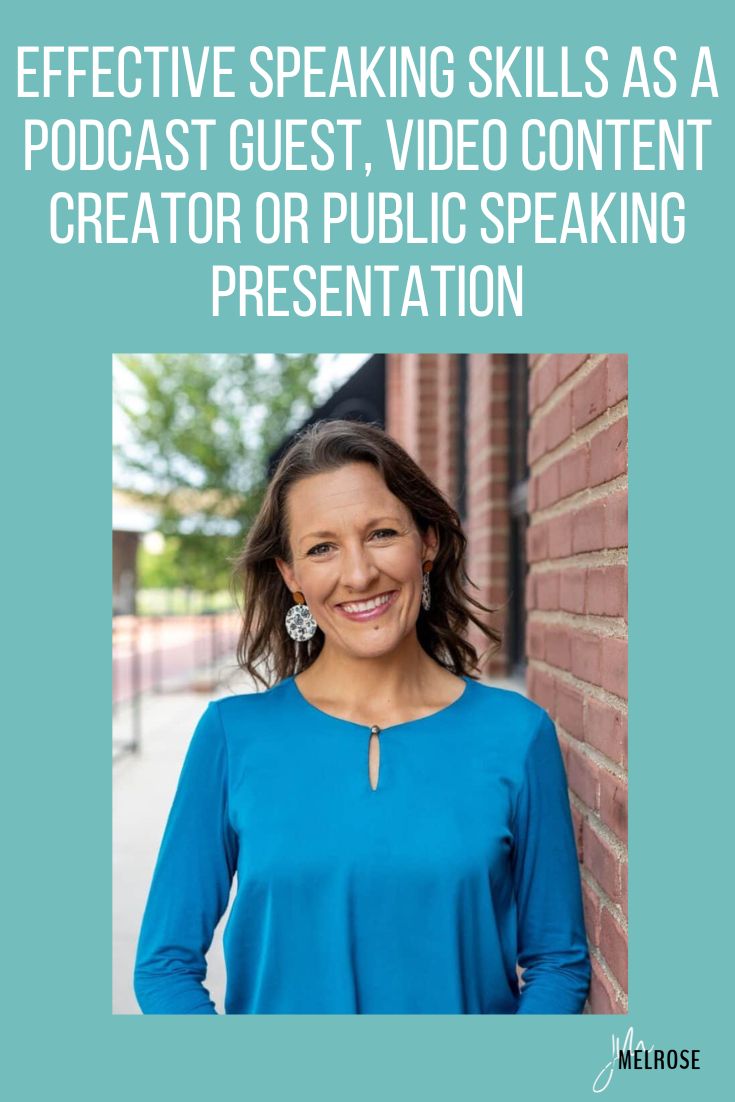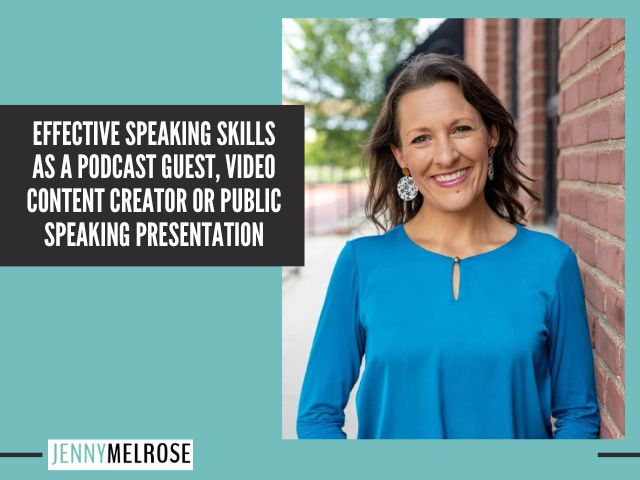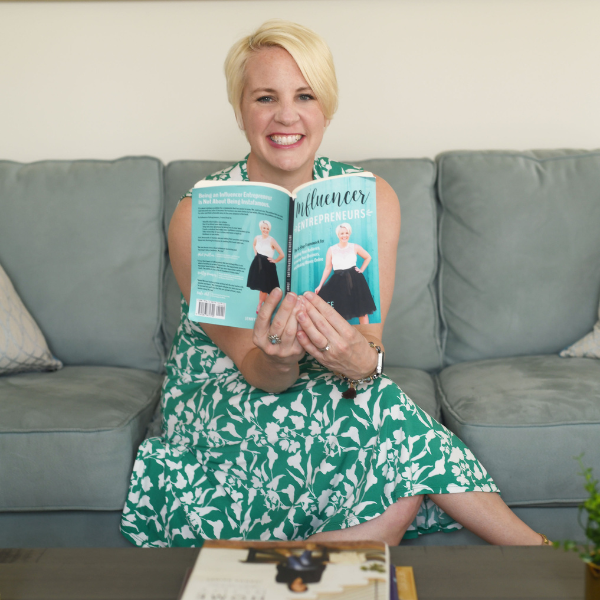We are talking about effective speaking skills as a podcast guest, video content creator or public speaking presentation with Katie Kimball.
IE 337: Effective Speaking Skills as a Podcast Guest, Video Content Creator or Public Speaking Presentation with Katie Kimball

Katie Kimball has a mother of four, teacher and educator, author of 7 cookbooks, blogger for two blogs, including Kitchen Stewardship and Kids Cook Real Food. She has been a featured guest on an international talk show, television programs, stages, multiple podcasts and was a TEDx speaker twice (here and here).
How can we develop effective speaking skills?
Here are some strategies for developing effective speaking skills:
- Just say “Yes” and do it!
- Assume you’ll stink the first time you speak and aim to improve gradually.
- Take advantage of online opportunities to speak in front of people, such as Instagram stories or Facebook Live. Be consistent you will get more poised and confident.
- Write a couple of talking points. Plan the first and last things you’ll say. Organize your thoughts and keep your audience engaged.
- If you’re presenting tips, limit them to three and unpack them systematically so that your audience can remember them better.
- Plan how you’ll close your presentation to leave a lasting impression. Last impressions are really important too! If you don’t have a planned close, just reintroduce yourself and your business and be finished.
- Practice speaking regularly to build confidence, just like a muscle.
- Embrace failure as a learning opportunity that can help you improve more quickly and be the person and business you want to be.
What are examples of effective speaking skills in our industry?
Watch other people whom you love and entertain you.
Who makes you grin when you listen to them?
Who do you learn from the most? Whose voice is in your head?
Deconstruct the speaker like you are in a college class. Here are some things to look for:
- Engaging storytelling: Good speakers are able to tell stories that capture the audience’s attention and keep them interested. They use personal anecdotes, humor, and relatable examples to make their points.
- Clear communication: Effective speakers are able to articulate their ideas clearly and concisely. They use simple language and avoid technical jargon that may confuse their audience.
- Confident delivery: Speakers who exude confidence are able to captivate their audience and hold their attention. They use eye contact, body language, and a strong, clear voice to convey their message. Pretend like you have confidence, even when you don’t. Act like you are A+.
Are there different speaking skills for podcasts guests as compared to public speaking presentations?
Yes, there are different speaking skills required for podcast guests as compared to public speaking presentations.
In a podcast, you don’t get to make eye contact with the audience, nor do you get to use your physicality in the same way.
That can be a benefit if you have nervous habits. You move your body differently than you would in person.
Podcasts are more conversational, and your brain needs to be more engaged to react to what the host or guest is saying.
Standing during a podcast recording will make me sound more energetic, project better, and sound better. If you are doing a really important recording and need to really bring the energy, you could jump up and down on a trampoline, do jumping jacks, and get your heart rate up.
You can even do speaking exercises to warm up your face, voice, and body. This is especially important when you are new.
You want your brain to be engaged so you can ask the next, best question to your guest.
If you are the guest, how are you going to answer that question well and draw it to a close effectively? You also need to be listening to the next question in case it isn’t on the list.
On the other hand, stage presentations are more structured and scripted, and your brain needs to be engaged in walking down the path you have already structured
There is much more preparation required for making scripted presentations perfect, in terms of using the significant words and stories and making everything flow together.
In speaking, there are different aspects to consider, such as the content, physicality, voice, and facial expressions. When you are not live on stage, you can hear someone smile when they are speaking as you listen to the recording.
For presentations with slides, it is crucial to practice the tech so that you are prepared for any situation.
You need to be professional. It’s also important to be very familiar with the tech.
Be humble and ready for mistakes. Have a backup plan.
For example, if you are being timed, you might need to have a section that you can drop if you accidentally go over time.
Preparing for the worst is next level and will make you ready if something doesn’t go as planned. You don’t want regrets after the presentation because you weren’t prepared.
Think about places where you might get applause if you are doing a live presentation and be ready to stand, be humble, and wait until you can speak again.
If you are uncomfortable doing live presentations, use video so that you can edit out your mistakes.
Be a podcast guest or use Zoom first to get practice. Then, you won’t need to be as familiar with the technology.
What speaking skills work best for video content creators?
Creating video content requires a unique set of skills to make the content compelling and engaging for viewers.
Bloggers and influencers typically create reels, TikToks, and other fast-paced video content, which requires knowing exactly what to say without making mistakes.
Going live is the easiest way to create video content since there is no editing involved. Even if you are embarrassed about a live video, you can always delete it.
To create quick content like reels, it’s essential to plan out exactly what you’re going to say and the captions.
It’s also crucial to practice a few times before turning the camera on to make it feel more natural.
While filming, it’s beneficial to record in five-second increments and watch it back to get to know yourself better.
The best tip for making video content is to watch yourself. Watching yourself in the frame helps you to see what works and what doesn’t.
This can also help you determine how to present yourself, especially when wearing certain clothing styles.
When creating video content, it’s essential to train yourself to look at the camera, especially when using platforms like Zoom.
Not looking at the camera can make it appear that you’re not making eye contact with your audience.
Other little things to consider when creating video content include training yourself to move your hands from right to left instead of left to right to make it easier on your viewer’s brain.
To create compelling video content, you need to practice, plan, and pay attention to details like making eye contact and body movements. Watching yourself on the video afterward is also a valuable tool that can help you improve your content and presentation skills.
What is the biggest mistake made when trying to have effective speaking skills?
The biggest mistake made when trying to have effective speaking skills is not being authentic and trying to fit into someone else’s mold or template.
It’s important to listen to experts, but ultimately, the speaker should make the final decisions based on their gut and what will appeal to their audience.
Another mistake is not trying enough new things, as the audience often loves surprises.
We just don’t know what will resonate with audiences.
Speakers should pay attention to data and deconstruct what works to better understand their audience.
Data isn’t always numbers. Instead, look at your top ranking videos and figure out what makes those better than other ones.
The last mistake is getting too salesy or nervous during a pitch because it can ruin an otherwise great presentation.
The speaker should be confident about their product and present it humbly yet confidently. When a person is nervous about selling, it wrecks the entire presentation.
Your product is going to change someone’s life for the better. Be confident, not frail, and sell something that will improve their life.
You have the right to confidently present that. Let your audience even take notes on your pitch. Pitch humbly and confidently.
Make sure your audience learns even if they choose not to work with you.
You can story sell and continue to teach while you are pitching. If you don’t put your product out there and help solve their problem, you are being selfish.
Finally, time management can be a challenge for entrepreneurs, and the Practical Entrepreneur Guide can help with this by freeing up time to focus on content creation and other aspects of business growth.
Action Steps:
- If you liked this episode of Influencer Entrepreneurs, please subscribe and leave a fabulous review!
- Join the conversation on Instagram by tagging Jenny when you’re listening to the podcast. She’ll send you a personal message whenever you tag her.


